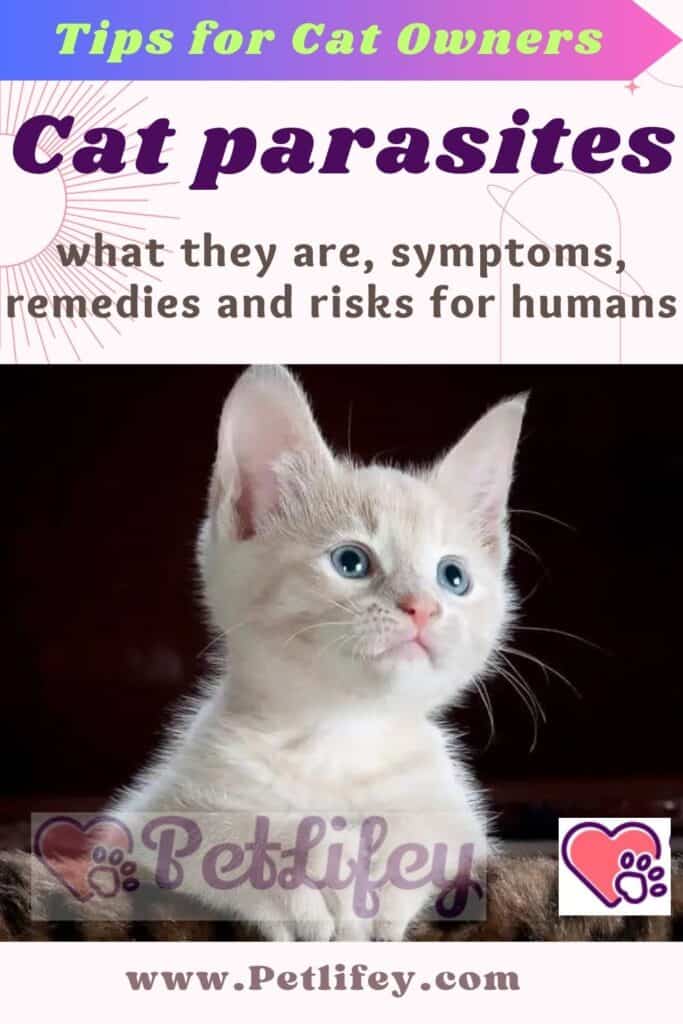
If you own a cat it is important to know the parasites that could affect it: in this article you will find symptoms, remedies and all the possible risks of fleas and the like for people too.
Cat parasites: characteristics, symptoms and remedies
Cats can be affected by various types of internal and external parasites: usually, cats living in apartments are less prone to the problem, while cats living in semi-freedom.
they are more exposed and must always undergo adequate preventive pesticide treatments.
Cat parasites are organisms that live on or in another organism (hence the distinction between internal and external parasites), each with their own characteristics, symptoms and remedies.
Usually, if the cat has fleas it begins to scratch and be restless: moreover, some cat parasites can also be transmitted to humans.
To safeguard your cat’s health, it is therefore essential to know the parasites that can affect it, to know how to recognize and identify them from the symptoms, but above all to know the most suitable remedies.
Furthermore, we must never forget the importance of antiparasitic treatments which must be done regularly according to a calendar similar to the calendar of compulsory feline vaccinations.
Cats: internal parasites
Cat parasites: characteristics, symptoms and remedies
- Roundworms or roundworms are often passed on to kittens from the mother through the placenta or mother’s milk. They can cause frequent episodes of vomiting in the cat and can be eliminated with specific products such as fenbendazole, milbemycin or selamectin.
- Tapeworms are usually contracted through food, by ingesting an infected flea or tapeworm eggs that lurk in certain foods. They can be found in the feces or around the cat’s anus, they are small segments similar to grains of rice that move like caterpillars. The treatment against tapeworms is based on praziquantel and milbemycin, in any case the preventive treatments against fleas also keep this internal parasite away.
- Hookworms spread through the skin, involve liquid diarrhea with blood loss, and can be eliminated with fenbendazole or milbemycin.
- Giardia is contracted by cats by drinking contaminated water. The most obvious symptom is chronic soft stools, which must be analyzed under a microscope to be sure. There is no effective cure, but you can try fenbendazole or milbemycin.
- Heartworm is transmitted through mosquito bites and can obstruct the cat’s heart and arteries. This disease can be prevented with selamectin, ivermectin or milbemycin.
Cats: external parasites
Cat parasites: characteristics, symptoms and remedies
When the cat has fleas
Fleas are the most common external parasites in cats and cause itching, allergic dermatitis and in some cases severe forms of anemia. The most obvious symptoms of a flea infestation are severe itching: the cat scratches itself until it forms scabs and hairless patches.
To understand if the cat has fleas, you need to comb it with a special comb and notice if black residues fall.
To combat fleas, the cat is given a treatment based on fipronil, selamectin or imidacloprid.
The same substances are also useful for prevention, which must be carried out regularly and especially at this time of the year.
Other external parasites
- Ear mites can be passed on to kittens from mom or other cats. Visible to the naked eye, they show up with sandy residues and dark spots inside the cat’s ear: if it is affected, the cat tends to shake its head and scratch itself. The cure for these parasites is based on selamectin.
- Ticks are usually found in tall grass and feed on the blood of the host animal. They can lead to various diseases, even lethal for the cat. To eliminate a tick you have to grab it with tweezers and remove it with a twisting motion, avoiding that the head remains stuck in the skin. Fipronil is used to prevent and treat cats with ticks.
- Cat lice do not affect humans: they are recognized by their red color that tends to black and are eliminated with special antiparasitic products for cats.
Pesticides: what they are and how to use them

Cat parasites: characteristics, symptoms and remedies
There are many types of specific pesticides on the market for cats. The most common are those in the spot-on formula, i.e. small drops that are applied between the shoulder blades of the cat and which must be administered once a month all year round, twice a month in the hottest months. They protect against both fleas and lice.
Other pesticide methods useful for cat health are:
- specific shampoos and lotions,
- flea and parasite collars,
- powders and sprays.
Finally, we must not forget the importance of careful home hygiene against cat parasites.






